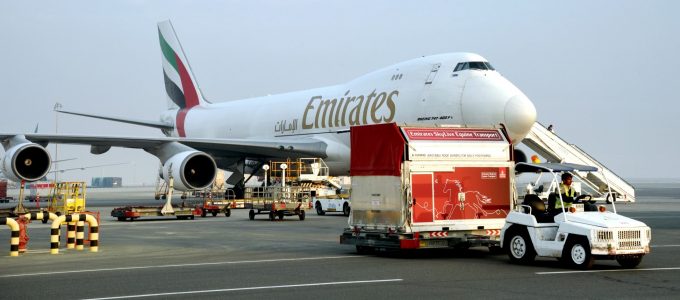Emirates orders five more 777Fs, as Boeing strike looks set to end
Emirates has announced a freighter order – and perhaps surprisingly, given current news, has opted ...
GM: RAISING THE ROOF GGM: IN FULL THROTTLE GZIM: MAERSK BOOST KNIN: READ-ACROSSMAERSK: NOT ENOUGHMAERSK: GUIDANCE UPGRADEZIM: ROLLERCOASTERCAT: HEAVY DUTYMAERSK: CATCHING UP PG: DESTOCKING PATTERNSPG: HEALTH CHECKWTC: THE FALLGXO: DEFENSIVE FWRD: RALLYING ON TAKEOVER TALKODFL: STEADY YIELDVW: NEW MODEL NEEDEDWTC: TAKING PROFIT
GM: RAISING THE ROOF GGM: IN FULL THROTTLE GZIM: MAERSK BOOST KNIN: READ-ACROSSMAERSK: NOT ENOUGHMAERSK: GUIDANCE UPGRADEZIM: ROLLERCOASTERCAT: HEAVY DUTYMAERSK: CATCHING UP PG: DESTOCKING PATTERNSPG: HEALTH CHECKWTC: THE FALLGXO: DEFENSIVE FWRD: RALLYING ON TAKEOVER TALKODFL: STEADY YIELDVW: NEW MODEL NEEDEDWTC: TAKING PROFIT

Just two years since it was the first airline to ditch the controversial fuel surcharge (FSC) for all-in rates, Emirates has reintroduced it.
In a note to customers, it warns that a new FSC will come into effect on 23 April, based on an AWB issuing date, and will be applied network-wide to all AWBs.
However, the new FSC mechanism is more complex than the standard flat rate previously applied. The carrier says it is more flexible, including a component differentiated for short-, medium- and long-haul flights, based on chargeable weight.
The mechanism is based on the fuel index, calculated from the average price of aviation fuel in five key spot markets, and based on the overall movement of fuel prices over a period of two weeks.
“This will better reflect the reality and impact of fuel costs incurred every time that there is a movement in fuel prices,” said a carrier spokesperson.
Forwarders and shippers were quick to question both the timing and the change. One forwarder said airlines saw fuel surcharges as a revenue stream and would be keen to reintroduce them as fuel prices rose.
But the Emirates spokesperson said it was a “customer-centric design to help shippers gain more transparency and accuracy in pricing”.
“Two years ago, based on the overwhelming market feedback that we received at the time, Emirates SkyCargo introduced ‘all-in’ pricing for cargo. At that point of time we were responding to our customers’ demand for a simple and transparent pricing mechanism that was a combination of a weight-related rate and the fuel and security surcharge that was prevailing then.
“Increasingly, we hear from our customers that the transparency that we hoped to deliver through the ‘all-in’ mechanism hasn’t worked as it was intended, and that the mechanism has not been dynamic or flexible enough to adapt to changing conditions in a volatile market.
“We believe that the new mechanism will eventually lead to a more accurate representation of the costs we incur, and that this will lead to the transparency that we hope to deliver to our customers and shippers.
“Our fuel surcharge indices will be reflected on our website and will assist customers in better planning airfreight cost.”
While shippers and forwarders were increasingly questioning what airline “all-in” rates actually covered, despite having lobbied for it, in general they simply appear to mistrust airlines and their reasons for change. As one forwarder told The Loadstar last year: “When oil was expensive we had surcharges; when oil got cheap we got all-in rates. You get the impression the airlines do whatever suits them.”
Rogier Spoel, air freight policy manager for the European Shippers’ Council, said: “It is a bit silly; we barely had two years of an all-in rate and it is already being dropped because oil prices are rising.
“Does this mean all-in rates only apply during economic low periods? All-in rates or a separate surcharge does not change much below the line, the total rate stays the same. However, we do believe that every single part that is issued as a rate should be negotiable.”
So far, Emirates appears to be the only airline looking to change strategy. Qatar, Virgin and American all told The Loadstar there was no change expected.
Last year, Cargolux reintroduced a security surcharge, which had been added into rates, much to the chagrin of forwarders, and Lufthansa Cargo, instead of creating an all-in rate, designed a new mechanism, said it had introduced “a net rate plus an adapted “airfreight surcharge”, to “reflect external and volatile cost factors”.
Emirates says it is “committed to the needs of our customers and to the highest standards of service delivery”.
It advises customers looking for more information on the mechanism to visit www.skycargo.com, where they will be able to see the charts:

Comment on this article